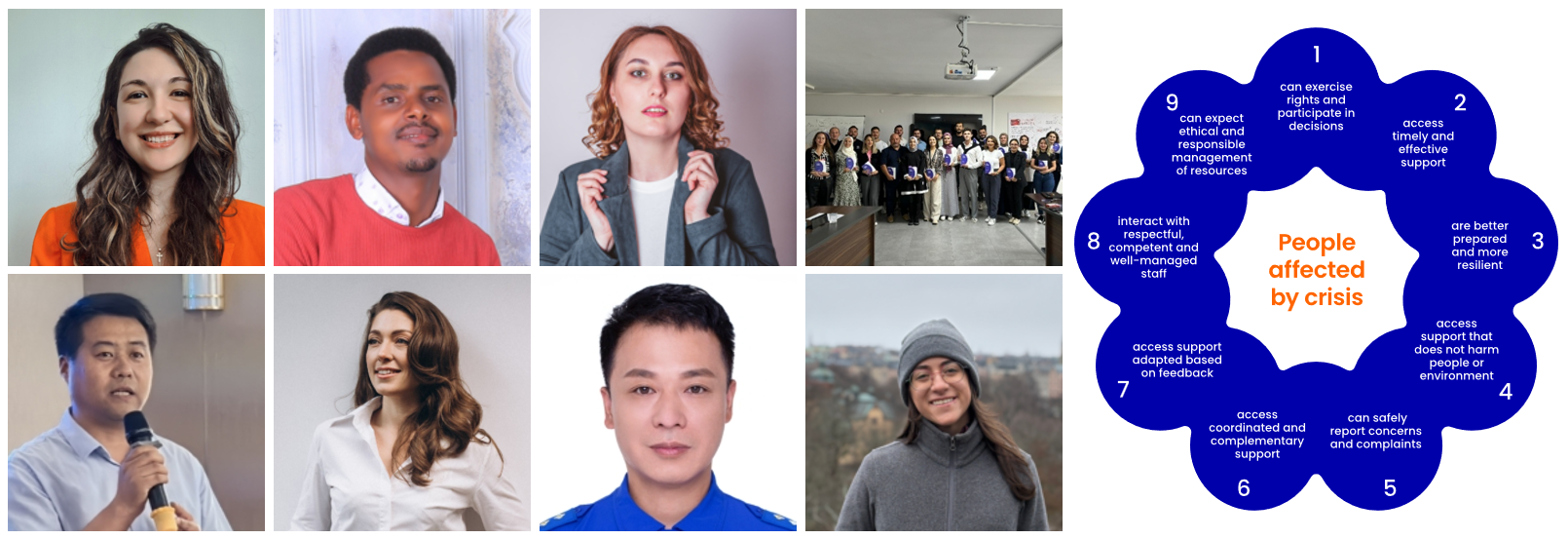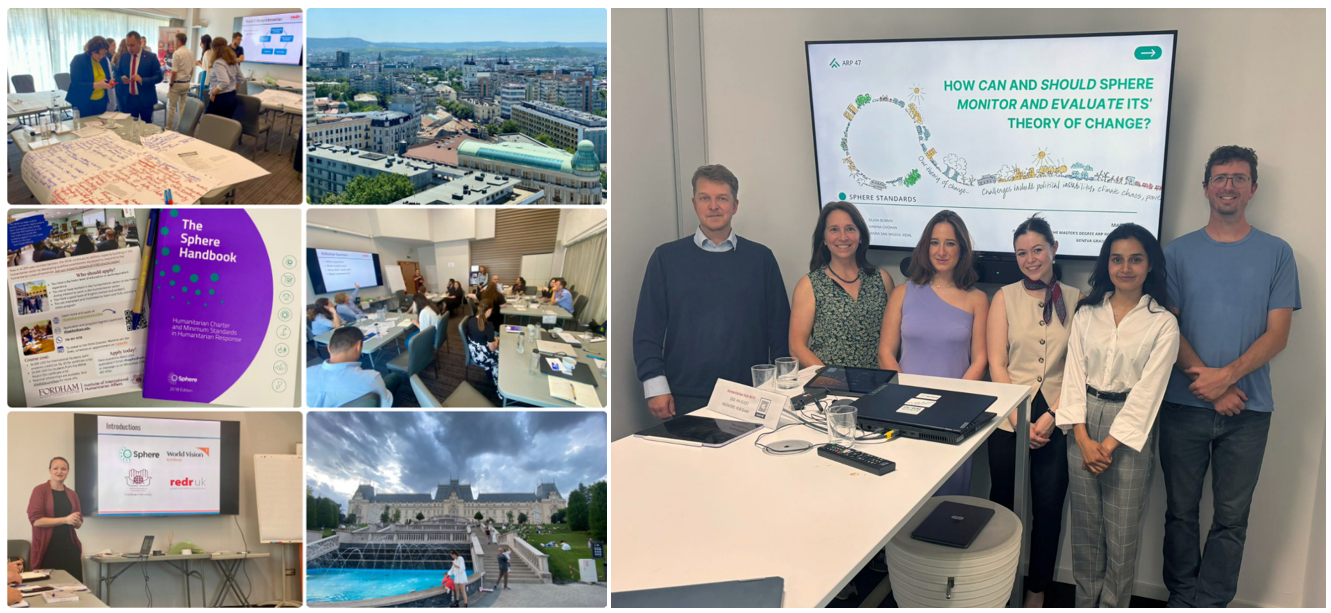Upholding humanity in crisis: Sphere’s Q2 2025 roundup
In the second quarter of 2025, Sphere continued to strengthen its impact and presence globally through training, partnerships, communication and advocacy.
Highlights include new research; new grants; newly translated and localised resources; AI literacy workshops in Romania; publication of our 2024 Annual Report; two new focal points; and eight new listed trainers.
With its ongoing commitment to localisation and strategic collaboration, Sphere continues to be the global hub for humanitarian standards.
The Sphere Handbook
The Sphere Handbook – Humanitarian responders make informed decisions that reduce morbidity and mortality by applying its principles and minimum standards. The Sphere Handbook continues to serve as a shared reference that enhances accountability, efficiency, and coordination in humanitarian action.
- Sphere supported focal point for Brazil and Portugal, Fraternity – International Humanitarian Missions (FIHM) and Sphere trainer Rami Rajjoub, to deliver English and Arabic editions of the Dignity first, always! online workshop series – with French and Spanish editions planned for later this year.
- There were two Sphere Training of Trainers (ToT) events this quarter: in Türkiye, facilitated by Sphere focal point representative (Nirengi Association) and trainer Zeynep Sanduvaç from 5 to 9 May for the Alliance of International Doctors; and in Ethiopia, facilitated by Sphere focal point representative (SOS Children’s Villages) and trainer Ayenew Bekele from 26 to 30 May for Dutch Relief Alliance

Dignity first always! | AID ToT in Türkiye
- Sphere welcomed eight new trainers to the global trainer database – from China, Ethiopia, Mexico, Romania, Türkiye and Ukraine.
- In collaboration with the Humanitarian Leadership Academy, Groupe URD and CHS Alliance, Sphere launched a one-hour self-paced e-learning module: Introduction to the Core Humanitarian Standard on Quality and Accountability (2024 edition) – available on Kaya in English, French, Spanish and Arabic.

New Sphere trainers | The Core Humanitarian Standard
Strategic Partnerships
Strategic Partnerships – People responding to crises have streamlined access to humanitarian standards relevant to their context and stage of response. The Humanitarian Standards Partnership (HSP) is a leading authority on humanitarian standards.
- In partnership with focal point World Vision Romania, The Institute of International Humanitarian Affairs (part of Fordham University), and RedR UK, Sphere organised two one-day in-person AI literacy workshops for humanitarians in Iasi and Bucharest, Romania, in June. These events follow previous events in Nairobi and at HNPW as part of Sphere’s AI Literacy workstream.
- Sphere, in partnership with Asia regional partner CWSA, CHS Alliance, and local partners, launched a capacity building initiative with support from the Disasters Emergency Committee (DEC) and the H2H Network. As part of this initiative, an accountability, learning, and planning workshop was held, bringing together experts from across the region.
- A group of three students from the Geneva Graduate Institute completed their Applied Research Project (ARP) titled “How can and should Sphere monitor and evaluate its Theory of Change?” While the ToC presents what Sphere does and why, the new report outlines how we can evaluate the outcomes and impacts of our activities.

AI workshops in Romania | GGI students present their report to Sphere staff
Policy & Advocacy
Policy & Advocacy – Sphere principles and standards are embedded into policies and operational frameworks at all levels, from local organisations to international institutions.
- Sphere released its 2024 Annual Report, including highlights like the Spanish MOOC (Massive Online Open Course), an AI Safety Label scoping project, the HSP board game, our Theory of Change, a Nature-based Solutions for Humanitarians online course, and a major project in Türkiye. The report includes several pages of updates from our focal point network, and, for the first time, environmental reporting – of carbon emissions from travel.
- Sphere focal point International Consortium for Refugees in Iran (ICRI) established a Persian version of the Sphere website at spherestandards.ir. This is a remarkable achievement including translation of website pages, training courses and guidance documents; and unique content for humanitarians in Farsi for humanitarians in Iran, other countries where Farsi is spoken, and their diasporas.
- Sphere focal point CADENA Mexico completed the translation into Spanish of Sphere’s Nature-based Solutions for Climate Resilience in Humanitarian Action Download here: Soluciones basadas en la naturaleza para la resiliencia climática en contextos humanitarios
- Sphere’s Director of Operations Tristan Hale represented Sphere at Artificial images in global health: Fakery before and in the era of AI, a workshop organised by the Institute of Tropical Medicine Antwerp and the McMaster University with the support of Fondation Brocher in Hermance.

Annual report | Farsi Sphere Handbook | NbS in Spanish | Hermance
- In a busy quarter for advocacy and influence in the humanitarian sector, Sphere collaborated with key partners in several meetings and for joint papers related to the crisis in Gaza and the ‘Humanitarian Reset’, supporting engagement with donors and UN decision makers related to promotion of International Humanitarian Law (IHL), systemwide planning, and enabling tools and services.
- Of note this quarter, Sphere Executive Director William Anderson participated in the 2025 ECOSOC Humanitarian Affairs Segment, including a side event on IHL and a meeting with ERC Tom Fletcher; the 2025 Humanitarian Leadership Conference, hosted by the Centre for Humanitarian Leadership in partnership with the Center for Conflict and Humanitarian Studies; and the eighth session of the Global Platform (GP2025) organized by the UN Office for Disaster Risk Reduction (UNDRR).
- In an interview with OneSec, Standards Without Listening Are Just Control, William Anderson shared why now is the time to re-center accountability on people’s dignity, not procedures; that the next Sphere Handbook must be more agile, digital, and community-fed; and how P-FIM is key to closing the gap between global standards and local context.
Champions Network
Champions Network – Sphere standards are locally driven, strengthening national and community-based actors in their leadership and application of globally recognised humanitarian standards. This approach reinforces sustainability and enhances the effectiveness of humanitarian response.
- Sphere welcomed new focal points in Austria (Global Responsibility) and Brazil (Ronimar Costa dos Santos), and had discussions with focal point candidate organisations in Singapore and elsewhere.
- Sphere hosted the first meeting of European focal points (9 April) and organised a global welcome meeting for new focal points and new focal point representatives (13 May).

New focal points | Focal point webinar
- We interviewed veteran Sphere trainer Ibrahim Hatibu about contextualising Sphere standards during food distribution in a refugee camp in Northern Kenya. Watch the full 10-minute video here.
- Sphere’s online forum has grown to 164 users. Topics discussed during the quarter included training, promoting the Humanitarian Charter, fundraising and camp management.
- Sphere greeted network guests from Indonesia and Nepal who were attending the UNDRR Global Platform on Disaster Risk Reduction (GP2025) alongside Sphere Champion Maurizio Spagnol. Dr Raju Thapa, focal point representative for DPNet-Nepal, presented their Global model for cost effective minimum humanitarian standards through Nepal’s Sphere localization on the Ignite Stage (read more: Nepal’s Unified Delegation Leaves Mark on GPDRR 2025 Outcomes).

Hatibu | Online forum | Raju and colleagues at GP2025
Communications
Sphere published five posts during the quarter – of which two were written by network members in Mauritius and the Democratic Republic of Congo – and one was a reaction to the Gaza Humanitarian Foundation’s claim, in a letter to Antonio Guterres, that they were “delivering food that that aligns with the guidelines set forth in the Sphere Handbook”. Sphere ran two email campaigns: a roundup of news (in English) and an invitation to an online Sphere workshop (in Arabic).
- Blog: Sphere makes a strong start to 2025
- Blog: 180 Degree Ltd Life.Change: A year in review as Sphere Focal Point
- Blog: From North-Kivu DR Congo to Geneva: Sharing local perspectives at HNPW 2025
- Statement: Sphere urges protection of civilians as conflict escalates in Iran
- Statement: Misrepresentation of the Sphere Handbook by the Gaza Humanitarian Foundation
- Newsletter: Latest Sphere news – June 2025
- Mail campaign: شة عمل عبر الإنترنت للتعريف بمعايير اسفيير وكيفية استخدامه
[Online workshop to introduce Sphere Standards and how to use them]

180 Degree Ltd Life.Change | From DRC to Geneva | Conflict in Iran
Operations, management and governance
Sphere held its Annual General Assembly (online) on 28 May. President of the Board Alper Küçük shared that longstanding Sphere trainer Axel Schmidt has been seconded to the Board. Following formalities, regional partner and member representative Tooba Siddiqui (CWSA) and member representative Margret Müller (Oxfam International) shared their experiences and reflections with the other members.
Sphere signed a memorandum of understanding with an established focal point by which a staff member of the partner organisation will be seconded into the Sphere secretariat from 14 July 2025 for one year. Sphere is grateful to focal point for Germany Aktion Deutschland Hilft (ADH) for sponsoring this position.
The Sphere team was delighted to welcome Helen Coronado to the secretariat as Development & Partnerships Lead (on a SYNI internship), and was thrilled that the whole global team was able to meet in-person for a three-day strategic planning workshop in May.
Sphere signed a new shared services agreement with CHS Alliance covering IT support, and finance and operations support in addition to office space.

Alper Küçük hosts Sphere’s General Assembly | Helen Coronado | Partner logos
While the humanitarian sector is in a state of flux, Sphere Standards continue to underpin at least 80% percent of all principled humanitarian action globally – and are more relevant and important now than ever.
